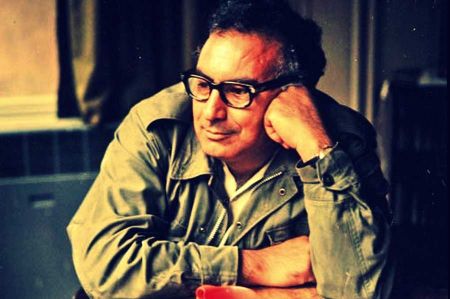Yasar Kemal - The Wind from the Plain
Yaşar Kemal (born Kemal Sadık Gökçeli 1923) is one of Turkey's leading writers. He has long been a candidate for the Nobel Prize in Literature, on the strength of Memed, My Hawk.
As an outspoken intellectual, he does not hesitate to speak on sensitive issues such as the plight of the ethnic Kurds in Southeastern Turkey. His activism resulted in a twenty-month suspended jail sentence, on charges of advocating separatism.
Kemal, who is of Kurdish origin, was born in Hemite (now Gökçedam), a hamlet in the province of Osmaniye in southern Turkey. His parents were from Van, who came into Çukurova during the First World War. Kemal had a difficult childhood because he lost his right eye due to a knife accident, when his father was slaughtering a sheep on Eid al-Adha, and had to witness as his father was stabbed to death by his adoptive son Yusuf while praying in a mosque when he was five years old. This traumatic experience left Kemal with a speech impediment, which lasted until he was twelve years old. At nine he started school in a neighbouring village and continued his formal education in Kadirli, Osmaniye Province.
.
Kemal was a locally noted bard before he started school, but was unappreciated by his widowed mother until he composed an elegy on the death of one of her eight brothers, all bandits. However, he forgot it and became interested in writing as a means to record his work when he questioned an itinerant peddler, who was doing his accounts. Ultimately, his village paid his way to university in Istanbul.
He worked for a while for rich farmers, guarding their river water against other farmers' unauthorized irrigation. However, instead he taught the poor farmers how to steal the water undetected, by taking it at night.
Later he worked as a letter-writer, then as a journalist, and finally as a novelist. He said that the Turkish police took his first two novels.
“ I don't write about issues, I don't write for an audience, I don't even write for myself. I just write. ” —Interview with The Guardian.
He published his first book Ağıtlar ("Ballads") in 1943, which was a compilation of folkloric themes. This book brings to light many long forgotten rhymes and ballads and Kemal had started to collect these ballads at the age of 16. His first stories Bebek ("The Baby"), Dükkancı ("The Shopkeeper"), Memet ile Memet ("Memet and Memet") were published in 1950. He had written his first story Pis Hikaye ("The Dirty Story") in 1944, while he was serving in the military, in Kayseri. Then he published his book of short stories Sarı Sıcak ("Yellow Heat") in 1952. The initial point of his works was the toil of the people of the Çukurova plains and he based the themes of his writings on the lives and sufferings of these people. Yaşar Kemal has used the legends and stories of Anatolia extensively as the basis of his works.
He received international acclaim with the publication of Memed, My Hawk (Turkish: İnce Memed) in 1955. In İnce Memed, Yaşar Kemal criticizes the fabric of the society through a legendary hero, a protagonist, who flees to the mountains as a result of the oppression of the Aghas. One of the most famous living writers in Turkey, Kemal is noted for his command of the language and lyrical description of bucolic Turkish life. He has been awarded 19 literary prizes so far and nominated for the Nobel Prize in Literature in 1973.
His 1955 novel Teneke was adapted into a theatrical play, which was staged for almost one year in Gothenburg, Sweden, in the country where he lived for about two years in the late 1970s. Italian composer Fabio Vacchi adapted the same novel with the original title into an opera of three acts, which premiered at the Teatro alla Scala in Milano, Italy in 2007.
Kemal lays claim to having recreated Turkish as a literary language, by bringing in the vernacular, following Mustafa Kemal Atatürk's sterilization of Turkish by removing Persian and Arabic elements.
Bibliography Yaşar Kemal
Stories
* Sarı Sıcak, ("Yellow Heat") (1952)
Novels
* İnce Memed ("Memed, My Hawk") (1955)
* Teneke ("The Drumming-Out") (1955)
* Orta Direk ("The Wind from the Plain") (1960)
* Yer Demir Gök Bakır ("Iron Earth, Copper Sky") (1963)
* Ölmez Otu ("The Undying Grass") (1968)
* Ince Memed II ("They Burn the Thistles") (1969)
* Akçasazın Ağaları/Demirciler Çarşısı Cinayeti ("The Agas of Akchasaz Trilogy"/"Murder in the Ironsmiths Market") (1974)
* Akçasazın Ağaları/Yusufcuk Yusuf ("The Agas of Akchasaz Trilogy"/"Yusuf, Little Yusuf") (1975)
* Yılanı Öldürseler ("To Crush the Serpent") (1976)
* Al Gözüm Seyreyle Salih ("The Saga of a Seagull") (1976)
* Allahın Askerleri ("God’s Soldiers") (1978)
* Kuşlar da Gitti ("The Birds Have Also Gone: Long Stories") (1978)
* Deniz Küstü ("The Sea-Crossed Fisherman") (1978)
* Hüyükteki Nar Ağacı ("The Pomegranate on the Knoll") (1982)
* Yağmurcuk Kuşu/Kimsecik I ("Kimsecik I - Little Nobody I") (1980)
* Kale Kapısı/Kimsecik II ("Kimsecik II - Little Nobody II")(1985)
* Kanın Sesi/Kimsecik III ("Kimsecik III - Little Nobody III") (1991)
* Fırat Suyu Kan Akıyor Baksana ("Look, the Euphrates is Flowing with Blood") (1997)
* Karıncanın Su İçtiği ("Ant Drinking Water") (2002)
* Tanyeri Horozları ("The Cocks of Dawn") (2002)
